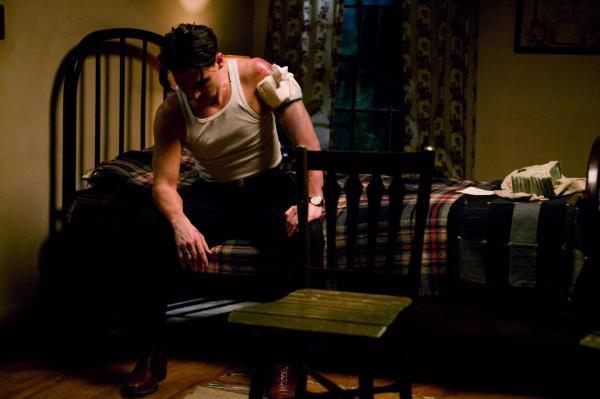Director: Carlos Cuar?n
Starring: Gael Garc?a Bernal, Diego Luna
UK Release date: 26 June 2009
Certificate: 15 (90 mins)
It’s a simple plot, really: two poor labourers, Rudo and Cursi, turn out to be good at football and, having run away from wives or hard work, win fame and fortune – for a while. En route, Cursi is seduced by a frivolous TV star and Rudo becomes embroiled in gambling debt. Cursi buys his new girlfriend the shallow trappings of fame (a large yellow SUV, bearing a certain resemblance – apart from the colour – to an armoured personnel carrier); Rudo attempts to share his good fortune with his wife and children. But, of course, everything is doomed. Such is fate.
From out of this straightforward (and familiar) tale, it is possible to draw a number of motifs and themes, if one so chooses. One is the shallowness of success and fame; another, masculinity; a third, Mexican identity; a fourth, football. A fifth might be something about the poor – but I think that’s more an interest of mine than of the makers of the film.
There is some irony that the shallowness of fame should be a surface concern of the film, given the star status of the two principal actors in it, Gael García Bernal and Diego Luna. In Europe and North America, these two shot to notice following the success of the road movie Y tu mamá también (2000). That they have ‘star status’ was acknowledged even by the BFI when both men, along with Rudo y Cursi’s director and producer, attended a question and answer session at the National Film Theatre on Monday 22nd June. Suggestively, a senior administrator of the Institute introduced the Q&A by remarking on the number of women in the audience – it got a laugh, but I can’t help thinking that what we are buying into in a film like Rudo y Cursi (which translates as ‘rough and vulgar’) is less some phenomenon of contemporary Mexican cinema than simply the familiar, controlled erotic idolatry of film stardom. The rest of the Q&A was dominated by tediously frivolous banter between the men on stage, which got tittering approval from a largely sycophantic audience, but provided those of us who’d paid the extra £5 with only a little additional insight into their ideas, motivations and concerns about cinema.
Y tu mamá también at least addressed some interesting territory: repressed homosexual desire, and the relationship between sex and death (as well as reprising the familiar stories of adolescent sexual adventures, big cars and long roads). There’s nothing of that in Rudo y Cursi, though there is a glancing attempt to build issues of masculinity into the plot (footballers in showers, ropey stepfather-son relationships, violent or useless men, etc, etc, etc).
Perhaps because of this lightness of touch, Rudo y Cursi apparently broke new ground in Mexico, being the first of the otherwise ‘art-house’ Mexican New Wave films to be widely viewed in its home country. It may be a sign of a maturity in Mexican cultural identity that a film such as this can be produced, a film which is less concerned with ‘problems’ of ‘Mexico’ than with producing a vapid but entertaining tale with popular appeal. But this brings me to that fifth potential theme, the representation of that country in general, and the lives of its poor in particular.
Gael García Bernal and Diego Luna have both described their efforts to develop characterisations of the labourers who are at the centre of this story, a story which opens with images of men working in the harsh conditions of the so called ‘dollar banana plantations’. Bernal, apparently uninterested in the economic conditions of the people, banally focused on their accent. He and Luna developed distinct ways of accenting their Spanish to mirror certain regional dialects, while remaining sufficiently mixed as to be impossible to place in one or other district of Mexico. This could be called simulacrum or even an affectionate recreation of the working man, but where I come from, we call it caricature. One way or another, it seems that Rudo y Cursi is a film in which rich people pretend to be poor (though some real poor people did get to play parts as extras, apparently).
So, while focusing on the unifying power of football, Rudo y Cursi inadvertently raises questions about the limits of the so-called ‘Mexican New Wave’. If what you want out of a Saturday night at the cinema is a light-hearted Mexican film about men playing football, then you will enjoy Rudo y Cursi. But don’t expect any insights into life, power or politics.
Ambrose Hogan
![]() Visit this film's official web site
Visit this film's official web site






